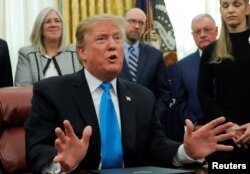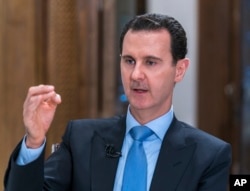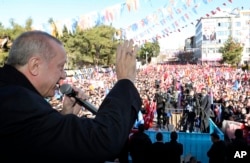Kurdish groups fighting Islamic State militants in Syria welcomed the U.S. decision to keep up to several hundred troops in Syria, saying the move would be crucial to keeping peace in the region.
The White House announced Thursday that it would keep up to several hundred American military personnel in northeast Syria after the U.S. withdraws most of its troops from the country.
White House spokeswoman Sarah Sanders said in a statement that a "small peacekeeping group" would remain in Syria "for a period of time."
Syrian Democratic Forces (SDF), a Kurdish-led alliance that is aided by the U.S. in the fight against IS, said the decision has come at a critical time.
"This is a very positive step," Polat Can, a senior leader in the SDF, told VOA. "The international community should know that the presence of such a force can avoid this region a real humanitarian catastrophe."
In December last year, U.S. President Donald Trump declared that U.S. forces would leave Syria. There are about 2,000 U.S. troops in Syria, according to Pentagon officials.
As the war on IS is nearing its end with the U.S.-backed SDF fighters closing in on the militant group's last stronghold in eastern Syria, Kurdish officials fear that other opponents might target them after U.S. troops withdraw.
"In addition to Daesh, we have Iran, the Syrian regime and Turkey waiting for the U.S. troops to leave so they can attack us," Can told VOA, using an Arabic acronym for IS. "The American decision could save thousands of innocent lives."
The partnership between the U.S. and local Kurdish forces has been successful in pushing IS militants from nearly all territory they once held since 2014, including their de facto capital, Raqqa.
Residents' reaction
Local residents in northeast Syria say they believe even a limited U.S. military presence could guarantee a long-lasting peace in their region.
"People here see this as a brave decision, which will make up for Trump's earlier decision to pull out his troops from Syria," said Barzan Sheikhmous, a local Kurdish journalist.
"The presence of an American force, no matter how small it is, is seen as the only deterrent to keep Syrian regime forces and allied Iranian militias at bay," Sheikhmous told VOA in a phone interview.
In a recent interview, Syrian President Bashar al-Assad vowed that the Syrian military would recapture all the territory that isn't currently under the control of his regime, including Kurdish-held areas.
Some experts also believe that keeping a number of U.S. troops in Syria could be a sign to encourage other countries to deploy their forces to Syria.
"Trump's decision is acknowledgement that there needs to be a small U.S. ‘anchor force' that remains in Syria, for the time being, to keep U.S. coalition partner militaries on the ground in Syria," said Nicholas Heras, a Syria expert at the Center for a New American Security.
Senior U.S. lawmakers and military officials recently called on America's allies in Europe to send troops to Syria to partake in protecting an internationally monitored safe zone in the northeastern part of the war-torn country.
"I believe that keeping a number of American troops and a larger number of coalition troops, with air protection, will play a role in securing stability and protecting the region, too," Abdulkarim Omar, co-chair of foreign relations of the Kurdish-led region, told the Reuters news agency.
A win for SDF
The U.S. decision is also seen as "a big win for the SDF, and even a win for [Turkish President Recep Tayyip] Erdogan, who for the time being does not have to worry about being held responsible for the re-emergence of ISIS in Syria," analyst Heras said, using an acronym for IS.
Turkey, which considers Syrian Kurdish fighters affiliated with the SDF as terrorists, has long threatened to carry out a military offensive in Kurdish-held areas in Syria. Ankara has also criticized the increased U.S. support for Syrian Kurdish forces.
"The U.S. government's ongoing attempts to fine-tune its Syria policy results from the need to balance the conflicting interests of its Syrian Kurdish partners and NATO member Turkey," said Aykan Erdemir, a senior fellow at the Foundation for Defense of Democracies, a Washington-based think tank.
But Erdemir charged that local politics in Turkey could hamper U.S. efforts to ease tensions between Turkey and Syrian Kurdish forces.
"As long as Erdogan continues his alliance with ultranationalist factions in Turkey and pursues a hard-line policy against Kurds at home and abroad, Washington might find it impossible to reconcile the incommensurable differences between its Syrian Kurdish and Turkish partners," he added.







